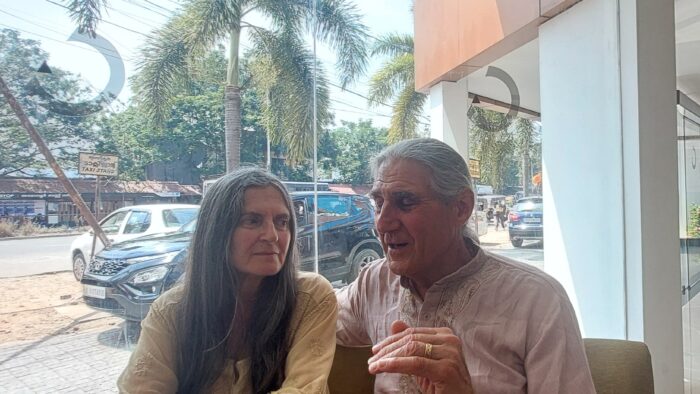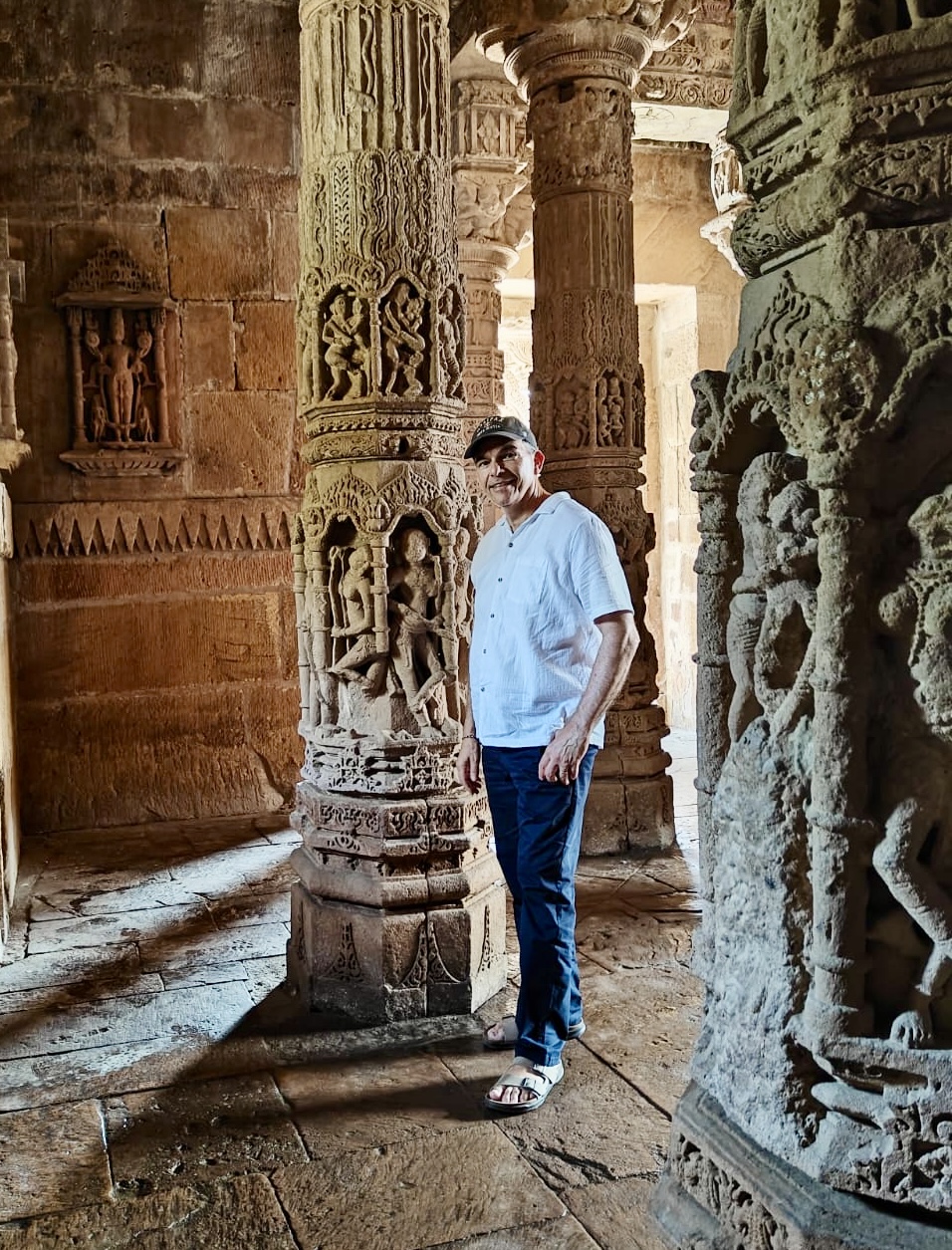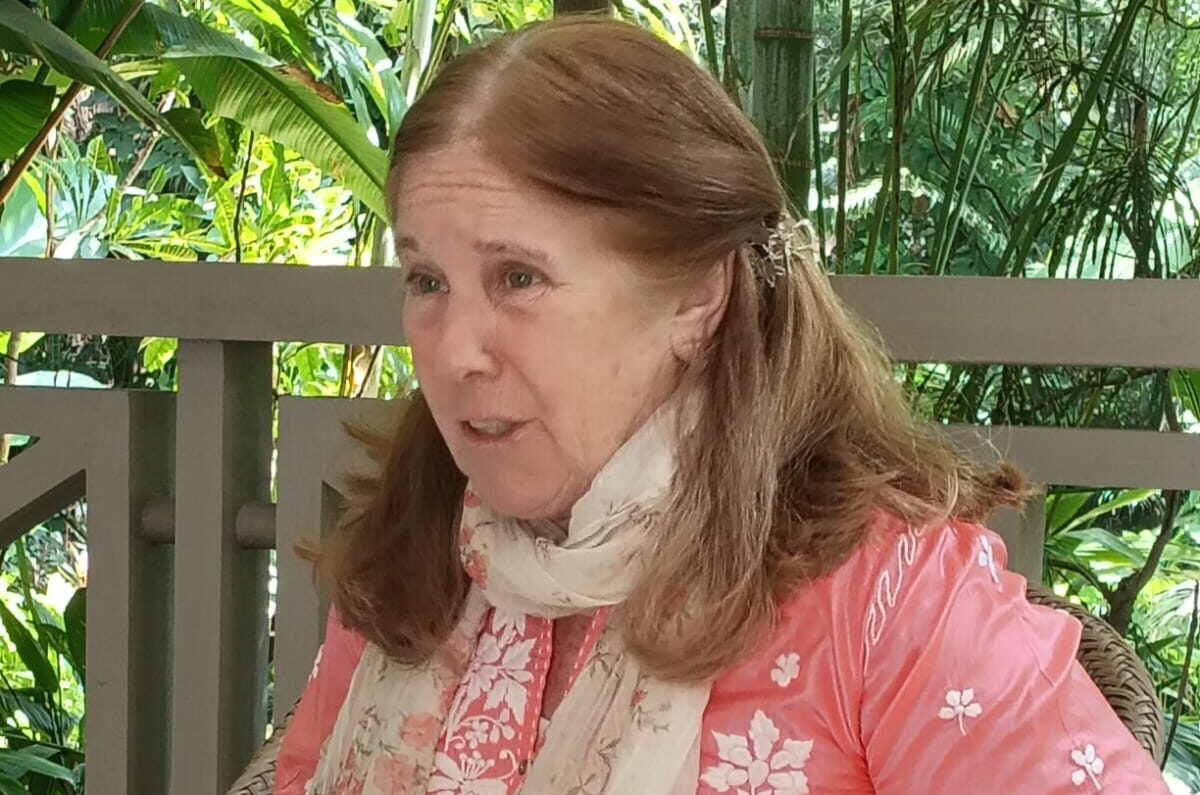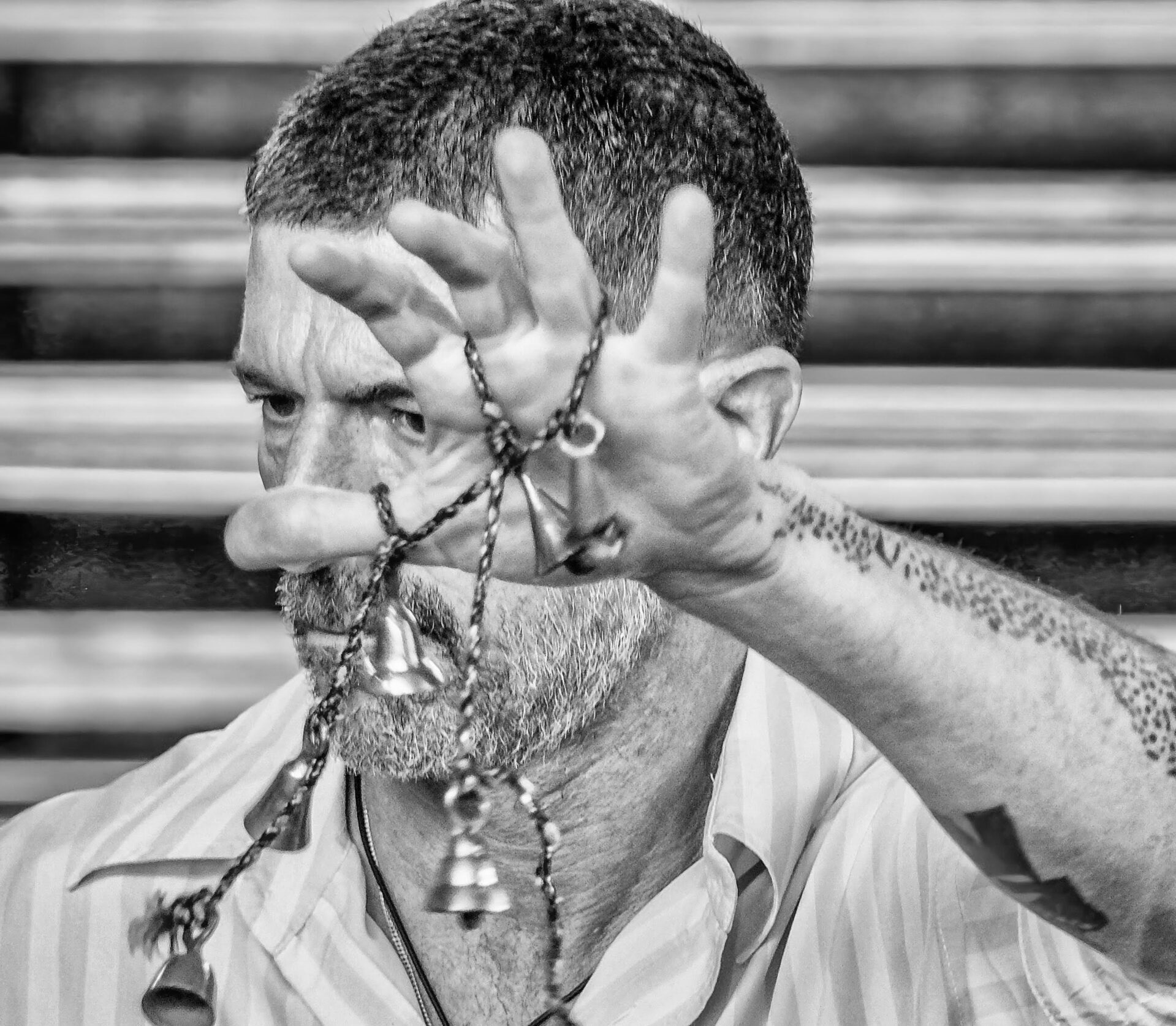Interview by Pradeep Krishnan
In a quiet hotel lobby in Thiruvananthapuram, two soft-spoken Americans shared the story of how a British mystic bridged East and West through silence, self-inquiry, and the soul’s search for truth.
Micha-El (Alan Berkowitz) and Gran (Beatriz Berkowitz) are long-time students and curators of the teachings of the renowned spiritual philosopher Dr. Paul Brunton (P.B.), whose pioneering work introduced many Western seekers to the ancient spiritual wisdom of India. As dedicated members of the Paul Brunton Philosophic Foundation (PBPF), a U.S.-based organization committed to preserving and disseminating P.B.’s legacy, the Berkowitz’s have played a significant role in making his profound writings accessible to spiritual aspirants around the world. Micha-El, with his background in psychology and education, and Gran, also with a background in psychology, combined with deep interest in contemplative practice, embody a quiet but steadfast commitment to inner inquiry, reflective living, and the path of philosophical-spiritual integration envisioned by P.B.
It was Paul Brunton who introduced Bhagwan Sri Ramana Maharshi, one of the greatest sages of modern India, to the Western world. His widely acclaimed book A Search in Secret India (1934) was instrumental in bringing the silent sage of Arunachala to the attention of sincere seekers around the globe. Through his vivid and reverent descriptions of his meeting with the Maharshi, P.B. opened a gateway for countless individuals to discover the path of self-inquiry and the profound stillness radiating from the presence of Sri Ramana.
The Foundation, established after P.B.’s passing in 1981, safeguards a vast archive of his unpublished writings, notebooks, and personal reflections, much of which has been edited and released over the years by a devoted circle of his students. This includes the sixteen-volume set of Paul Brunton’s Notebooks (available in India from Motilal Banarsidass). The foundation also aims to nurture a universal approach to spiritual truth—one that transcends the boundaries of religion, culture, or creed. At its heart lies a deep reverence for India’s timeless spiritual traditions, including Advaita Vedanta, Yoga, and meditation, balanced with a modern sensibility rooted in reason, scientific openness, and inner transformation.
Micha-El and Gran’s spiritual orientation reflects this broad and inclusive perspective. They emphasize inner stillness, self-inquiry, balanced living, and the development of intuition and insight—all core tenets of P.B.’s “Philosophy of the Whole.” Their approach is neither sectarian nor dogmatic; rather, it invites quiet reflection, a search for Truth within, and a compassionate engagement with life. Both have spent considerable time in India, visiting places associated with P.B.—especially those linked to Sri Ramana Maharshi, whose teachings had a profound impact on Brunton.
My first meeting with Micha-El and Gran took place at Hotel Chaithram in Thiruvananthapuram, where they had arrived as part of their spiritual travels through South India. We sat in the quiet lobby of the hotel, and over the course of our conversation, they answered my questions with calm clarity, patience, and a humility that reflected their inner depth. There was no rush, no pretension—only a gentle earnestness that made the interaction both meaningful and memorable.
Later, my wife Sreelakshmi and I had the pleasure of meeting them again at Anandashram in Kanhangad, the serene ashram founded by Swami Ramdas, whom P.B. had also visited and who he held in high esteem. In that spiritually charged atmosphere, we shared reflections on the teachings of P.B., our own spiritual journeys, and the enduring relevance of India’s wisdom traditions in today’s world. These encounters offered us not only a glimpse into the legacy of Paul Brunton through two of his committed students, but also affirmed the universal language of the soul that binds all seekers across time and place.
Excerpts from the exclusive interview:
Please tell us about yourselves, your place of birth, and your journey into spiritual life.
Micha-El: I was born in New York, United States. From early on, I felt disconnected from conventional social life. During my university years, I went through a deep personal crisis and fell into depression. I realized that the things people usually chase—success, wealth, relationships—wouldn't bring me true happiness. Around that time, someone suggested I visit the American Brahmin Bookstore in town. That bookstore happened to be run by a student of Paul Brunton named Anthony Damiani. And that visit marked the beginning of my spiritual journey.
Both of us are psychologists, and we translate Paul Brunton’s writings into English and Portuguese.
Gran: I was born in Brazil into a Catholic family. From a very young age, I was drawn to contemplation and meditation. Unlike many others, I didn’t struggle much to find my spiritual path—it was as though the path was always with me, waiting to unfold.
I later became a psychologist because I wanted to understand human beings more deeply, including their spiritual dimensions. When I moved to the United States in 1995, my spiritual journey truly deepened. I encountered several gurus, including one Maharishi named Prem Raha. I also met Trigueirinho in Brazil and discovered the teachings of Paul Brunton. That meeting was transformative. One day, Alan and I came together as a result of our contact with Trigueirinho, with the shared vision of spreading Paul Brunton’s teachings.
How did you come in contact with Paul Brunton’s writings? Have you met him personally?
Micha-El: Yes, I’ve met him. My teacher was a student of Paul Brunton, whom we affectionately refer to as P.B. Our group would read his books together and have deep discussions. We also studied Advaita Vedanta, Patanjali Yoga, and explored traditions like Buddhism, Hinduism, Alchemy, and Greek philosophy. But the core of our study was always P.B.
P.B. spent the last 30–40 years of his life in Switzerland, living as a recluse. Some say he chose Switzerland because the Alps reminded him of the Himalayas. He received few visitors, but they included notable figures—royalty, scientists, politicians. Many made excuses to travel to Geneva and then quietly visit him.
My teacher, Anthony, told P.B. that he needed assistance in his later years. At that time, I was living in Anthony’s spiritual center – Wisdom’s Goldenrod Center for Philosophic Studies. We weren’t monks in the traditional Indian sense, but we lived a disciplined spiritual life. Anthony suggested sending one of us to help P.B.
That’s how I went to Switzerland—initially just to assist: cook, shop, and help around. I was fortunate to be with him on three separate occasions: in 1975, 1977, and 1980. The last time was when he had a hernia, and I lived in his apartment, taking care of his body.
Being with P.B. was indescribable. The silence around him was so deep, it felt loud—like being at the bottom of the ocean. Across the Lake Geneva from his home was Mont Blanc, the great white mountain. The silence of the mountain and the silence of P.B. were equally profound.
Despite being a sage, he had an English personality—practical, fond of tea—and also a love that was beyond words. It wasn’t emotional love, but a deep, tender, spiritual presence.
Gran: I never met Paul Brunton physically, but I want to speak from the perspective of someone who deeply connected with him telepathically. He always said that physical contact wasn’t essential—that you could connect with him through his books and teachings.
When I started reading P.B, I felt as if he was voicing my own thoughts. Everything he wrote felt familiar, like a forgotten truth resurfacing. Though I had studied under other teachers like Triguerinho, Yogananda, and even joined the Self-Realization Fellowship for three years, it was P.B.’s teachings that brought everything together.
I used to say, “This is it.” His words gave form to my own inner knowing. It was a profound homecoming. Every day I read him, I felt immense joy and a growing silence within. His teachings made me want to dwell permanently in that inner stillness.
Please share briefly about the activities of the Paul Brunton Philosophic Foundation.
Micha-El: When P.B. left his body, the copyright of his works passed to his son, Kenneth Hurst—named after one of P,B.’s first teachers. Kenneth was already associated with Wisdom’s Goldenrod, founded by Anthony Damiani. Together, a group of us created the Paul Brunton Philosophic Foundation to preserve and publish P.B.’s writings.
P.B. left behind volumes of handwritten notes—ring binders full of spiritual insights. Our spiritual community of about 60 people went through them, categorizing and organizing. P.B. had appointed two editors to make the final selections for publication.
We grouped quotations thematically—for example, under “Meditation”—and assigned ranks to them. Eventually, these became part of P,B.’s Notebooks, which only represent about 40–50% of the total material.
We also established Larson Publications, a publishing company that began with spiritual texts P,B.’s followers wanted to preserve. A Swedish student of P.B, Robert Larson, had already started Larson Publications in Sweden, and we partnered to create the U.S. counterpart.
The Foundation’s mission is to keep P,B.’s legacy alive. His books help readers enter into contact with his mind and consciousness. He expressed himself with great care—he was a spiritual journalist of sorts. Though he never claimed to be a sage or guru, he called himself a researcher. Everything he wrote was from his own experience, not mere hearsay or tradition.
What makes P,B.’s teachings different from traditional Eastern gurus and Swamis?
Micha-El: P.B. offered a unique synthesis of ancient and modern teachings. When he first met Ramana Maharshi, he had no questions—he already knew the answers within. But he felt the need to convey these truths to Westerners, many of whom didn’t understand Sanskrit or Hindu concepts. So he sought to express the ineffable in clear, modern English.
His gift was making spiritual truths accessible. He once wrote:
"My work has always been based on first-hand knowledge of what I wrote about, not on hearsay or tradition. My researches were made not only among modern books and ancient texts, but also in the mysterious witness of my own consciousness." He was a pioneer, offering a practical spiritual path suited for people living in cities—not just monks or renunciants in the Himalayas.
How would you describe the relationship between psychology and spirituality?
Gran: Unfortunately, many psychologists today deny the spiritual dimension. And some spiritual seekers dismiss the importance of psychological work. Both approaches are incomplete.
Micha-El: In the U.S., we call this spiritual bypassing. For example, someone might think, “I have anger issues, but if I meditate or follow a guru, I don’t need therapy.” That’s not true. P.B. emphasized the philosophic path, which involves self-purification and transformation. You have to clean your personality. Even if divine light is present, a dirty window blocks it.
Gran: P.B. spoke of two approaches to the spiritual quest:
- The Long Path – Self-effort, purification, tapas (austerity), and sadhana.
- The Short Path – Turning inward directly, through grace, once the seeker is prepared.
Both are valid. But the Long Path’s emphasis on psychology helps clear the obstacles, the emotional knots that block spiritual clarity.
You once said the short path is identification with the Real Being. Could you elaborate on what you meant by that?
Gran: Yes, the short path is identifying with the Atma, your real Self. That’s the essence. Not just once in a while, but all the time — constantly remembering and being with the Atma, as if you’re in love. When you’re in love with someone, they never leave your thoughts — not even for a moment. That’s the intensity of the short path. The Atma becomes your beloved, always present, never distant.
Paul Brunton once crossed paths with Carl Jung — could you paint a picture of what that meeting was like?
Micha-El: Yes, that’s a different story altogether. Jung didn’t feel the need to seek another guru. He had a chance to see Maharshi but didn’t take the opportunity, saying “The guru is an archetype — if you see one, you see them all.” But I think that’s a limited view. Jung came from a psychological framework. Psychology is vital, yes, but without spirituality, it’s incomplete.
In your view, how does psychology shape or influence the journey of spiritual growth?
Gran: Certainly. We’ve seen many spiritual seekers stuck because of unresolved psychological complexes. For example, someone might lose a loved one and suppress the grief by saying, “God willed it.” But unless the emotional wound is healed, that suffering blocks inner progress. Repressed sorrow repeats itself. So, psychology and spirituality are two wings of the same bird — essential parts of a universal sadhana. To truly transform, we must engage both.
Earlier, you spoke of an incident from Trivandrum — could you recount what happened and why it was significant?
Gran: Yes, tragically, a couple lost their only son to illness. On his first death anniversary, they took their own lives. This shows the urgent need for emotional healing alongside spiritual knowledge. Paul Brunton expressed it beautifully: “It is not enough to attain knowledge of the soul. Any mystic may do that. It is necessary to attain clear knowledge. Only the philosophic mystic may do that.” He emphasized clarity — removing mental obstructions, emotional complexes, ego distortions. That’s psychological work.
P.B. experienced a period of personal crisis — how did that chapter in his life unfold?
Micha-El: Yes, he did. He once contemplated suicide. Unlike Ramana Maharshi, who lay down and realized the Self, P.B. asked, “What happens after death?” So he went to the British Library in London and studied. After learning about life after death, he realized there was no point in killing himself. That was his turning point. From that crisis, he began his spiritual quest.
Ramana Maharshi’s grand-nephew, Ganesan, offered a memorable account of Paul Brunton — how did he portray him?
Micha-El: Yes, he said, “That self-realization can be attained by you and me is amply proved by Paul Brunton’s life.” P.B. was not born an avatar — he was just like you or me, full of questions and doubts. But his life proves that enlightenment is attainable by ordinary people.
Paul Brunton later delved deeply into Vedanta — how did that exploration shape his work and thought?
Micha-El: Yes, after his initial awakening, he didn’t stop. The Maharaja of Mysore gave him retreats where he wrote books and studied classical Indian philosophy with initiated Vedantins. P.B. wanted to clarify everything — not just superficially say, “It’s all Maya,” but to truly understand: Maya is not illusion; it is Shakti. The world is real as an expression of consciousness.
Paul Brunton’s book Hidden Teaching Beyond Yoga stirred considerable debate — what lay at the heart of that controversy?
Micha-El: People misunderstood. They thought P.B. was rejecting yoga. But he said, “Yoga is a step, not a stop.” He wasn’t dismissing it — he was pointing beyond it. After calming the mind through yoga, one must inquire into the nature of the mind itself. That’s the hidden teaching.
You’ve written about India becoming increasingly westernized — what trends or changes led you to that observation?
Micha-El: It’s true. India is rising as a technological power, but many young Indians are disconnected from their spiritual roots. I once asked a young Indian girl in the U.S. about the Bhagavad Gita. She replied, “I think my grandmother has that book.” That’s heartbreaking. At an airport, we met a group of Indian students flying to Delhi — none had heard of Ramana Maharshi. The traditions are there, but many don’t know how to relate to them.
In today’s fast-paced world, how can modern minds meaningfully engage with age-old spiritual traditions in everyday life?
Micha-El: P.B. taught that meditation is vital — even for busy people. If you’re a businessperson, meditation helps you make better decisions. There’s a practical benefit. But the deeper purpose is transformation. P.B. would say: “Pray constantly, in the true sense of prayer. Meditate a hundred times a day. Think of the Overself always.” Whatever you do — whether you’re a journalist or a tech worker — live with awareness of the Self. That's the integration.
You’ve observed that suffering often leads people toward spirituality — why do you think that is?
Gran: Very often, yes. Suffering wakes people up. It forces them to ask the deeper questions. The value of spirituality is always there, but ignorance veils it. The quest begins when something inside us turns inward — it’s a longing to remember.
So, in today’s world, is it still possible to inspire others simply by living as an example?
Gran: Absolutely. We have nieces and nephews. They observe us and ask, “Why are you vegetarian? Why do you meditate?” You don’t have to preach. Just live authentically. The seed is already in them — your life becomes the water and sunlight.
Paul Brunton described his teaching as a blend of “Metaphysics, Mysticism, and Practical Action” — how would you unpack that triad?
Micha-El: Yes. P.B. chose the word philosophy because it contains the ancient meaning — “love of wisdom.” He structured his approach in three stages:
- Mysticism – Silencing the mind, entering stillness.
- Metaphysics – Understanding that the world is a series of ideas in the mind. This is mentalism.
- Practical Action – Returning to the world without mental reactivity, acting from the awareness of Oneness.
That’s why he called it philosophical mysticism. You go beyond mysticism by grounding it in clear philosophical understanding and embodying it through daily living.
So, Paul Brunton’s aim wasn’t merely to share theory — he wanted people to put it into practice?
Micha-El: Exactly. Real spirituality isn’t just about beliefs — it’s about realization and integration. He gave a kind of “recipe” — not to follow blindly, but as a guide to remember your divine essence every moment. Meditation, mindfulness, self-inquiry, service — these are all practical ways to live the Truth.
You often talk about integrating spirituality into everyday life — what does that actually entail?
Micha-El: Living the spiritual life is not about separating it from daily life—it’s about bringing it into every part of your world. For example, if someone makes me angry, the spiritual response isn’t just suppression—it’s self-inquiry. Why am I angry? Maybe my father struggled with anger. But then the deeper realization comes: this anger isn’t really me. These are just thoughts. The short path, as P.B. teaches, reminds me: I am light, I am love. So I ask, “How could I relate to this person through love?”
Gran: Exactly. P.B. gives practical exercises for developing this. It's not about pretending to be peaceful; it’s about becoming that presence—moment by moment.
How does that vision translate into simple, everyday actions?
Micha-El: Let’s say I’m washing dishes. I ask: Am I doing this with awareness? Am I living as the Overself in this moment? If I walk, how would I walk as the Overself? It changes everything.
Gran: We’re not going to become enlightened tomorrow—we already are enlightened in essence. What keeps us from living that? A busy, unaware mind. So the practice is: presence. Conscious presence in every action.
From that inner space, how can one approach and handle conflict?
Micha-El: If I know who I am, I don’t react unconsciously. I use right intelligence and presence to resolve the situation. Every event in life comes as a lesson. If I pay attention to it with awareness, that becomes a deeper learning than reading any book.
For someone just discovering Paul Brunton, which of his books would you suggest they start with?
Gran: The Secret Path is a wonderful introduction—it explains meditation clearly. The Quest of the Overself brings Ramana Maharshi’s self-inquiry into an accessible English form. And then there are The Notebooks—which are like an encyclopaedia of spiritual wisdom.
Micha-El: Yes, the Notebooks are in 16 volumes. You don’t read them sequentially. You go to the Table of Contents and find what speaks to your present need—whether it's health, relationships, or meditation. Volume 16 even includes a full subject index for the entire series.
Gail: P,B.’s early books—like The Inner Reality, Wisdom of the Overself, and Beyond Yoga—are deeply philosophical. They explore topics like death, dream states, and the nature of the “I”.
Micha-El: These were influenced by V. Subramanya Iyer, who was a teacher of his after Ramana. Subramanya gave him the intellectual framework—the metaphysics of truth.
You’re currently translating Paul Brunton’s works into Spanish and Portuguese — how is that process progressing?
Gran: It’s been beautiful. We’ve devoted the last few years to making P,B.’s work accessible across South America. We're collaborating with the Paul Brunton Philosophic Foundation and have founded a non-profit organization in Brazil for this titled APhilosophia (www.aphilosophia.org).
Micha-El: We’re working with a major Brazilian publisher, Ajna. The Illuminated Mind will be released this year, which includes P,B.’s own account of his Illumination. We will also be publishing A Search in Secret India and Perspectives (Volume 1 of the Notebooks) in Portuguese. In Spain, the first publication will be The Short Path to Enlightenment, translated into Spanish.
Gran: And we hope to expand into Indian languages too. Many people in India only know P.B. through A Search in Secret India. But he wrote nine more books and 16 volumes of Notebooks after that! These shorter, accessible selections from the Notebooks are ideal for translation.
I understand you’ve been connected with spiritual masters, Trigueirinho and Raphael — what unites their teachings?
Micha-El: These are all Westerners presenting eternal truths in a modern form. Raphael translated all of Shankara’s works into Italian and many have been translated into English. Trigueirinho emphasizes the different levels of being—the koshas, the soul, the Atman. P.B, blends mystical experience with philosophical clarity.
Gran: P.B. used to say—you don’t need to become Indian. You need to become who you are. We in the West have a deep spiritual tradition too—Plato, Plotinus, Christian mystics—but we’ve lost touch with it. P.B. reawakens that.
I’ve heard it was through Paul Brunton’s grace that you met — could you share the story behind that meeting?
Micha-El: [Smiling] It’s true. I was visiting P.B. at the recommendation of my teacher Anthony, and at that time Trigueirinho also had an interview with P.B.’. I had the privilege of serving P.B. during his hernia surgery in Switzerland. and Trigueirinho came to visit P.B.—he had traveled all the way from Italy.
Gran: (interrupting) But P.B. refused to meet him at first— he said it wasn’t the right time. When they finally met, Alan was there. He served them tea. That’s how he met Trigueirinho.
Micha-El: That meeting set off a chain of events that led me to meet Gran in Miami, years later. She was helping with Trigueirinho’s work, coordinating it in North America. We met at a conference, sat in a balcony facing the ocean, and chanted a mantra—and in that moment, a double rainbow appeared.
Gran: From that point on, we knew something greater was guiding us. Eventually, we unified our paths and our lives.
What led you to take up the work of translating Paul Brunton’s writings?
Micha-El: We translate his books into Portugese, and they are published in Brazil. Eventually, we also became translators of Trigueirihnho into English and these books are published by the Shasti Association in the U.S. (www.shasti.org). Though we don’t publish in Portuguese ourselves, we collaborate with a publisher. That became our dharma — our spiritual duty.
That’s a rare kind of partnership — how has sharing this dharma shaped your relationship?
Micha-El: Absolutely. Someone once asked Trigueirinho why there are so many divorces. He replied, “Because people don’t have a spiritual dharma together.” So whatever your relationship is, it's important to share a common spiritual direction. Brunton also talks a lot about marriage – he was married himself, so his teachings are both philosophical and practical. We recently attended a wedding in Gujarat, and we brought along quotes from P.B. about marriage. We printed them on little cards and gave them to the couple. They loved the quotes. It shows how applicable his teachings are in daily life.
So, you see your time in India as something beyond a tourist experience — what does it represent for you?
Gran: Yes, we’re not tourists. We are here as pilgrims. We have a spiritual task, a shared dharma. Our life is beyond being ‘normal’. And that’s why we keep meeting people like you — because of this spiritual flow. P.B. connects people.
Could you recount a recent incident that captures this connection through Paul Brunton?
Gran: Sure. Just yesterday, we were on a flight from Mumbai. It was delayed, and when we finally checked in, we were upgraded to premium economy. Micha-El sat beside a young businessman and I sat across the isle from an older man in traditional Indian attire. During the flight, he and I started talking about Swami Sarvapriyananda – a contemporary Ramakrishna-Vivekananda Swami. I love listening to him. When I mentioned it, the younger man next to Micha-El said, “He’s my uncle,” and showed us a picture of him. What are the odds of that happening?
But equally amazing is that the man across the isle from is a Professor and Swami Sarvapriyananda was his student! I then gave a P.B. book to the him, and he read it during the entire flight — one and a half hours — and asked to take a photo of the book. I later sent him P,B.’s works. It was magical.
Have you delivered public talks on Paul Brunton during your time in India?
Micha-El: Yes. We gave a lecture at the Divine Life Society in Rishikesh — about 100 people attended. They were prepared, open-minded. It was a beautiful session. That talk is available on our YouTube channel, PaulBruntonOfficial. We also delivered a talk at Thiruvannamalai.
P.B. isn’t for everyone. In Hinduism, there's a concept of adhikara — spiritual fitness. Not everyone is ready. Some people enjoy the mystical feeling, but P.B. urges us to go deeper, to think and reflect.
So P.B.’s path requires active engagement, not just passive listening?
Gran: Exactly. For P.B, philosophy is a social activity. You need discussion, reflection. It’s like going to a restaurant — we all order different things. P.B. is for those ready to think deeply and balance spiritual practice with rational reflection.
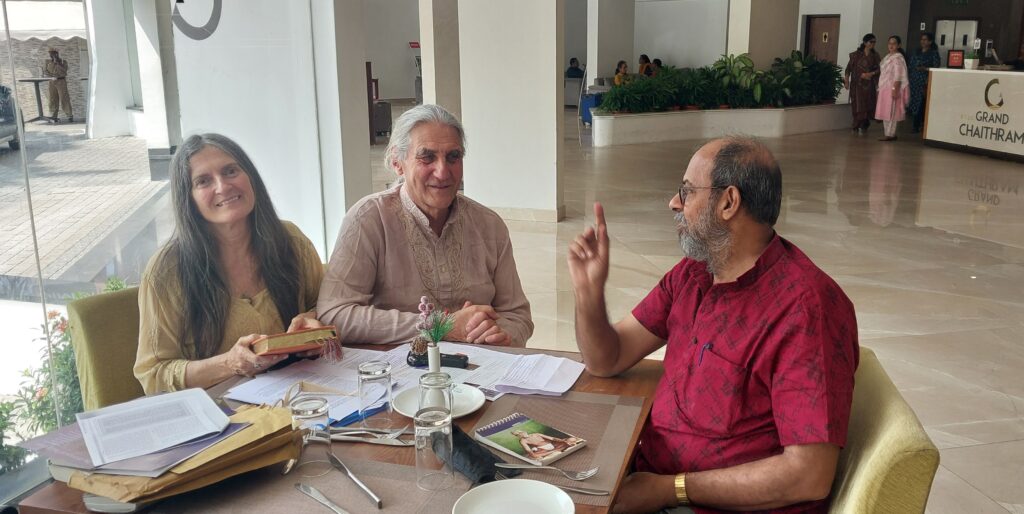
What is one teaching of Paul Brunton that you consider especially powerful?
Micha-El: One of his central concepts is the “Overself” — what Vedanta calls the Atman. P.B. writes:
“The Overself is the inner or true self of the person, reflecting the divine being and its attributes. It is an emanation from the ultimate reality but is neither a division nor a detached fragment of it. It is a ray shining forth but not the sun itself.”
That image — the sun and its ray — is so profound. You can’t just grasp it intellectually. You write a quote like this on a card, read it while waiting for a train or bus, and reflect. That’s rational reflection — one of the pillars of his path.
Paul Brunton also placed strong emphasis on practical spiritual exercises — is that right?
Micha-El: Yes, he gave affirmations or declarations — about 27 in his Perspectives. These are tools to uplift the mind from its ordinary patterns. For example: “God is ever smiling on me.” Even when life is tough, that thought can lift you. Or “I cooperate joyously with the higher purpose of my life.”
Paul Brunton also speaks about the need to balance multiple spiritual dimensions — is that correct?
Micha-El: Yes. He spoke of a “Balanced Path” — five essential aspects:
- Religious veneration
- Mystical meditation
- Rational reflection
- Moral re-education
- Altruistic service
He said when these are balanced, you touch the Overself — like the center of a star formed by five points. You become integrated.
What resources are available today for those who want to explore Paul Brunton’s work?
Micha-El: Many. There’s our personal website, ThePathofPhilosophy.org, which shares about P.B, Trigueirinho, Yogananda, and others. We also run the PaulBruntonOfficial YouTube channel,
which has the only existing recording of P,B.’s voice. Just hearing his voice is moving. And a great
resource is the website of the Paul Brunton Philosophic Foundation, www.paulbrunton.
What messages would you share with readers who are in search of a spiritual path?
Micha-El: Find a spiritual path that brings you closer to God. It won’t be easy, but it will bring deep rewards. P.B. is a great guide for today’s world — fast, modern, distracted — because he came from it and showed us how to live spiritually within it.
Gran: Keep practicing, don’t lose sight of your purpose. Remember who you truly are. Society won’t give you the silence or time you need — you must impose it. Don’t let others confuse your real being. Be inwardly grounded.
Pradeep Krishnan is a Commerce and Law graduate with a postgraduate diploma in journalism. He served in an Indian government department for 36 years before dedicating himself to writing. A passionate author and journalist, he has contributed articles in English, Hindi, and Malayalam to several reputed periodicals and online portals.
He is the author of two books: Leaving Churchianity: Conversations with Ex-Christians Seeking Redemption in Sanatan Dharma, and Arivinte Abhimughanal (Interviews of Wisdom), a Malayalam anthology featuring conversations with 35 eminent personalities.

